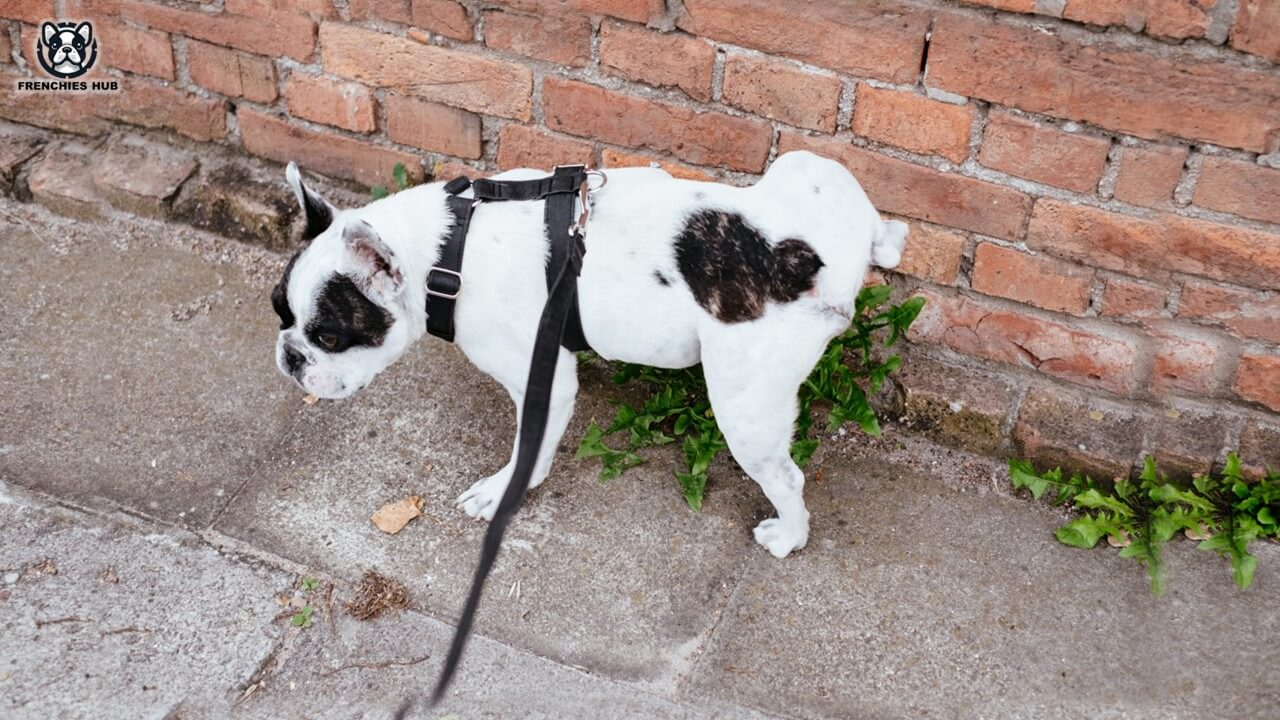Bringing a French bulldog into your house transforms it into a home filled with joy, laughter, and a few puddles of pee. As a pet owner and enthusiast, I’ve navigated through the challenge of understanding why some dogs have a tendency to urinate more frequently than others. In this blog, we’ll dive into the reasons behind this peculiar behavior, emphasizing that it’s not just a simple problem but a sign that warrants our attention and care. From water intake adjustments to diagnosing health conditions like Urinary Tract Infection (UTI), Diabetes, Kidney Disease, Cushing’s Disease, and others, we’ll explore how each factor contributes to your French Bulldog’s need to urinate often.
Managing your dog’s health requires a balance of knowledge, patience, and understanding. Conditions such as Medications side effects, Behavioral Issues or Anxiety, Bladder Stones or Crystals, Age-Related Incontinence, and Spinal Cord Issues can all lead to frequent urination. Through personal experiences and gathered expertise, I’ve learned that each of these factors can significantly impact your French Bulldog’s well-being. It’s not just about keeping your floors clean; it’s about ensuring your furry friend lives a happy and healthy life. By acknowledging these underlying causes, we can take proactive steps towards providing the best care for our beloved pets.
Why Does My French Bulldog Urinate Frequently?
Observing our dogs adeptly relieving themselves, whether indoors or out, is part of the pet ownership journey. However, when this behavior occurs more frequently than usual, it raises eyebrows and concerns. As a devoted pet owner and someone who has navigated the waters of canine health, I’ve come to understand that excessive urination isn’t merely a quirk. It could signal an underlying medical condition requiring attention. The act of a French Bulldog urinating more often than expected warrants a closer look, not just a quick trip outside.
Consulting a veterinarian becomes imperative when these signs appear, as they are the experts in diagnosing and recommending the right course of action. From dietary changes to medications, the solutions are as varied as the causes. My personal experience with a French Bulldog who suddenly started spending more time in the vicinity of the door, eager to go out, taught me the importance of prompt medical consultation. It turned out to be a treatable condition that, once treated, restored peace and routine to our home. This journey underscores the essence of vigilant pet care and the invaluable role of professional veterinary advice in maintaining our furry friends’ health and happiness. Here are some reasons:
Territory Marking: A Natural Instinct
When our Frenchies engage in the act of urination, it’s not just about relieving themselves; it’s a complex behavior deeply rooted in the instinct of territory marking. Unlike humans, who might use stickers or magic markers to claim their belongings, dogs have their unique way of communicating their presence. They leave their mark on grass, sidewalks, and virtually any surface they deem part of their domain. This behavior is characterized by a sudden burst of pee that differs from the ongoing stream of normal urination. It’s their way of saying, “This is mine.”
Observing a Frenchie meticulously marking deposits outside of their main area highlights their nature as creatures of habit. They often return to the same spot to reinforce their scent markers. When this behavior seems to escalate or becomes a problem, it’s crucial not to resort immediately to liquid repellents or furniture covers as solutions. Instead, understanding the motive behind the marking and considering professional help from an animal behaviorist can offer more humane and effective resolutions. It’s important to remember that punishing a dog for such natural behavior can do more harm than good. Recognizing and addressing the root cause, rather than the symptom, paves the way for a healthier relationship between you and your pet.
Understanding Aging: Changes in Urination
As our beloved pets transition from the puppy stage to their golden years, their bathroom habits can change significantly. Observing a dog urinating more frequently than usual may raise concerns for any pet owner, especially those who are navigating the joys and challenges of pet ownership for the first time. Whether your family pet is just settling into your home or has been a companion through many seasons, understanding the impact of aging on their need to urinate is crucial.
In their youth, puppies often find themselves outside every few hours, their small bladders unable to hold much, and their control over them still developing. It’s quite normal for a young pup to need the bathroom more frequently, typically every five to six hours. As they grow, mastering the art of house-training becomes a testament to their development and your patience. However, as they advance into their golden years, you might notice a return to more frequent trips outdoors. This isn’t a regression in training but rather a natural part of the aging process.
Navigating these changes requires a blend of understanding, patience, and proactive care. Consulting with a vet can provide invaluable advise on how to support your healthy dog through this transition. Health issues related to urination can arise, and a professional can offer the best guidance on maintaining health and comfort for your pet. Aging in dogs, much like in humans, brings about changes that, with the right approach, can be managed gracefully, ensuring your French Bulldog remains happy and healthy through all phases of life.
Tackling Urinary Incontinence: A Common Concern
Among the health concerns for French bulldogs, Urinary incontinence stands out as a notably common issue. This condition, characterized by involuntary dribbling of urine, can be disconcerting for both the dogs and their owners. Understanding that incontinence can stem from a variety of causes, including changes in bladder pressure or a decrease in control, is the first step towards addressing this problem.
Managing water intake and ensuring regular walks to maintain healthy bladder function are proactive steps to prevent leaks. It’s crucial to approach urinary incontinence with empathy, recognizing that it is a natural process and not a behavioral issue. Therefore, punishing your pet for accidents related to incontinence is not only unhelpful but can also be harmful to their wellbeing. Consulting a veterinarian is essential in these scenarios, as they can offer advise on the best management strategies or treatments. Whether through medication, lifestyle adjustments, or other interventions, there are effective ways to support your French Bulldog and manage this condition, ensuring they continue to lead a happy and comfortable life.
Diabetes: A Closer Look at the Symptoms and Consequences
When it comes to diabetes in dogs, the signs can be alarmingly similar to those observed in humans. This condition prevents dogs from efficiently converting sugar into energy, forcing their bodies to turn to fat as an alternative energy source. This metabolic shift triggers a series of reactions, including increased thirst and increased urination, alongside excessive hunger and weight loss.
As diabetes progresses, it complicates matters further, making it difficult for affected dogs to shed pounds. Additionally, the extra sugar lingering in their system can lead to infections, posing another layer of challenge in managing the disease. Understanding these symptoms is crucial for pet parents, as early detection and management can significantly impact the quality of life for your French Bulldog.
The Role of Urinary Tract Infection
In the world of canine health, Urinary Tract Infections (UTIs) emerge as both a common and treatable issue, particularly prevalent among dogs. These infections tend to affect older female dogs at a higher rate than male dogs, regardless of the age group. A UTI can transform the urine’s appearance, making it colored and cloudy, and often increasing in volume. Pet parents might also observe signs of disorientation in their pets, a condition known as uremia, alongside other symptoms like hazy or blood-tinged urine.
The distressing sight of a beloved French Bulldog struggling with urination, whining in discomfort, and positioning their legs unusually before beginning can alarm any pet owner. These signs often point to the presence of bacteria in the urethra, necessitating immediate antibiotics treatment. While UTIs are indeed serious medical conditions, the knowledge that they are commonly faced and effectively managed with proper care can provide some reassurance. For those navigating the complexities of their dog’s health, understanding UTIs’ implications is crucial in ensuring the wellbeing and comfort of their furry companions.
Increased Thirst: Understanding Your Pet’s Needs
When the warmer months roll around, it’s natural for your Frenchie to spend more time outside, soaking up the sun and enjoying the great outdoors. Unlike humans, dogs don’t sweat to cool down; instead, they rely on panting to regulate their body temperature. This increased panting leads to a significant use of their body’s water stores, necessitating a greater intake of water to stay hydrated.
Returning indoors doesn’t halt their need for rehydration. Even with the temperature inside being normal, your pet might consume an ever-increasing amount of water to replenish what was lost, sometimes leading to more frequent urination in your house. To manage this, keeping your French bulldog hydrated, especially if you’re staying outside for extended periods, is crucial. An innovative design like the French Bulldog Portable Water Bottle, equipped with triple filters and a water circulation system, ensures your pet has access to fresh water at all times. This approach not only addresses your pet’s thirst but also helps prevent the inconvenience of unexpected accidents indoors.
Conclusion
Discovering your French bulldog peeing excessively can be a cause for concern among many owners. It’s not uncommon to wonder whether a change in diet, such as eating new dog food, or an underlying illness could be prompting this increase in bathroom breaks. The truth is, the reasons behind a dog’s change in urination habits can vary widely. While it may be tempting to speculate—especially if your pet has recently switched to a food they haven’t had before—the possibility of them being sick should not be dismissed lightly.
Ensuring your French Bulldog remains healthy and comfortable involves taking proactive steps. This may include consulting with a veterinarian to rule out or treat any potential health issues. While the direct cause may not always be immediately apparent, understanding that you’re not alone in this situation can be comforting. Many owners face similar challenges and, with the right approach, find effective ways to manage their pet’s health and wellbeing.

